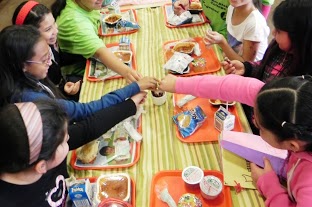To make dinner as nag-free as we can, my family follows few rules at our table. But one rule I insist upon is something I learned from a fourth grader as part of the Family Dinner Project’s lunch mentors program with the Lynn, Massachusetts Public Schools.
Don’t Yuck on my Yum.
I had never heard it before this student used it to defend her choice of sandwich. It means you shouldn’t criticize the food that someone else is eating and likes. Don’t yuck on my yum. What I think is yummy, don’t say yuck about. So often, one child embraces something interesting, healthy, uncommon, or ethnic and gets criticized for it. What is unknown scares kids. What smells strong or looks different seems strange and weird. Kids then criticize what is unknown to them to make themselves feel less anxious about being different. This happens over and over to children from certain traditions or with varied tastes or personalities. Eventually a child’s tastes get worn away to the lowest common denominator until everybody’s eating chicken nuggets and noodles.
It happened to my son Elijah in first grade. He came home and asked that we never again send him to school with seaweed snacks. Someone had made fun of him for the way it smelled. Here we were so proud of his willingness to embrace the healthy food of another culture. All the work we had done to expose him to variety and diversity was erased in a moment. It happened again the next week with hummus – a favorite of my childhood and culture.
Part of what we teach and learn at the table is to approach difference, to live in community with others and to respect others for their unique qualities and experiences. My colleague Bob Stains at the Public Conversations Project is fond of saying that the dinner table is the first classroom for diversity. And the ability to be adaptive in different situations, to be flexible when confronted with something out of the norm, builds resilience in children. I think sometimes children need a mantra to help them through that moment and don’t yuck on my yum is the one that we have chosen in our family. If you are tempted to look disparagingly on the choices of others, remember don’t yuck on my yum!
For me this goes beyond what we do at the table, it’s become a value in the rest of our life—to remember that we can learn from what others appreciate. Instead of naming our dislikes in the face of what others like, or discouraging diversity , we are learning to suspend judgment, to ask what it is they like about it and try it. My wife and I say it to each other when one of us looks in the mirror and says something disparaging about ourselves. I say it to my kids when they wrinkle their nose about what the other one chooses to play or wear.
Elijah is in third grade now and has begun taking seaweed snacks and hummus to school again. I hope what he is learning at our table is a willingness to be different and accept difference. I hope that we can build communities where our children are embraced for their difference and nobody ever yucks on their yums.
